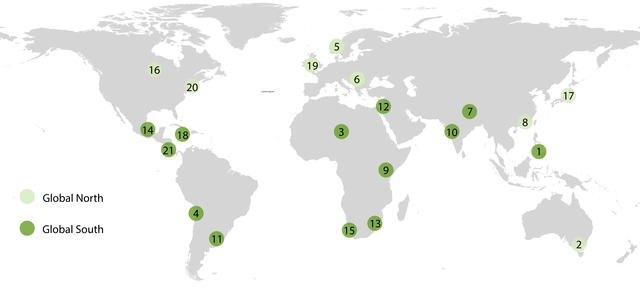In order to develop and mainstream a ‘bottom-up’ approach to regional climate risk, My Climate Risk is working with a number of institutions and universities around the world to form a ‘mycorrhizal network’ of hubs (communities of practice), that will share knowledge and resources to work towards My Climate Risk’s goals, and support an ecosystem of more informal activities aligned with My Climate Risk. The MCR regional hubs are listed below (click the image for larger view).

| Hub Host Institution | Focal Point | |
|---|---|---|
| 1 | Ateneo de Manila University (Manila, Philippines) | Daniel Ratilla |
| 2 | Australian Bureau of Meteorology (Melbourne, Australia) | Mitchell Black |
| 3 | Centre Régional AGRHYMET (Niamey, Niger) | Abdou Ali |
| 4 | Centro de Estudios Avanzados en Zonas Áridas (CEAZA), Chile | Boris Dewitte |
| 5 | Climate Futures, Norwegian Research Centre (NORCE) (Bergen, Norway) | Jesse Schrage |
| 6 | Faculty of Physics, University of Belgrade (Belgrade, Serbia) | Milica Tosic and Vladimir Djurdjevic |
| 7 | Himalayan University Consortium (Kathmandu, Nepal) | Chi Huyen Truong (Shachi) |
| 8 | HKUST (The Hong Kong University of Science and Technology, Hong Kong) | Alexis Lau |
| 9 | IGAD Climate Prediction and Applications Centre (ICPAC) (Nairobi, Kenya) | Masilin Gudoshava |
| 10 | Indian Institute of Tropical Meteorology (IITM) (Pune, India) | Roxy Mathew Koll |
| 11 | National Scientific and Technical Research Council (Buenos Aires, Argentina) | Federico Robledo & Natalia Pessacg |
| 12 | Royal Scientific Society (RSS) (Amman, Jordan) | Iain Stewart |
| 13 | South African Environmental Observation Network (SAEON) (Pretoria, South Africa) | Nicole du Plessis and Jennifer Veitch |
| 14 | Universidad Veracruzana (Veracruz, Mexico) | Carolina Ochoa-Martinez |
| 15 | University of Cape Town (Cape Town, South Africa) | Chris Jack |
| 16 | University of Manitoba (Winnipeg, Canada) | Julienne Stroeve, Jennifer Lukovich |
| 17 | University of Tsukuba (Tsukuba, Japan) | Van Doan |
| 18 | University of the West Indies (Kingston, Jamaica) | Tannecia Stephenson |
| 19 | Walker Institute, University of Reading (Reading, UK) | Ros Cornforth |
| 20 | Yale University (New Haven, Connecticut, USA) | Jessica Seddon |
| 21 | University of Costa Rica (San Jose, Costa Rica) | Ana Maria Duran Quesada |
The network of hubs is expected to help WCRP to bridge climate information and society by grappling with the complexity of local situations while maintaining the methods of analysis simple enough to be interpretable and open to interrogation. In addition, the use of more straightforward methodologies that build trust and transparency facilitates the co-production and co-ownership with the end-users of the climate information. The ultimate goal of My Climate Risk is to empower local communities to make sense of their own situation. More details of My Climate Risk philosophy can be found in Rodrigues and Shepherd (2022).
Below, Regina Rodrigues and Ted Shepherd (My Climate Risk Chairs) respond to some of the questions that they have received about the hubs.
The regional hubs are conceived as a locally-based alternative to the traditional WCRP structure of panels and high-level working groups. They are expected to help catalyze a variety of activities following the spirit of My Climate Risk, such as webinars, workshops, training schools, inter-disciplinary research teams, etc., in order to build communities of practice, and to do so mainly from their own resources. They are also expected to share their experiences through web pages, contributions to newsletters, and participation in the My Climate Risk annual General Assemblies. Importantly, the hubs are not expected to coordinate all MCR-relevant activity within their region. Rather, they are available as a potential contact point, and source of support, for those who need it. Perhaps the word ‘hub’ is misleading, and they can be seen more as ‘outposts’ of My Climate Risk.
We had an explicit aim of ensuring global representation, and a balance between Global North and Global South. Several of the hubs arose from the WCRP Climate Research Forums, which exposed the wider climate science community in a particular region to the suite of WCRP activities, including My Climate Risk. Others arose from direct inquiry or from discussions as the MCR leadership team explored potential partnerships during the initial phase of the activity, where we identified groups that already shared the spirit of My Climate Risk. We seek to add more hubs in parts of the world where the international expertise and coordination that WCRP can provide is helpful for building and empowering the local climate science community interested in climate risk at the decision scale. However, we also need to learn to walk before we can run!
We expect the typical regional hub to be quite a small group of researchers, albeit working within a larger institution (normally a university), and to be actively engaged in capacity building so that we can help train the next generation of scientists working in this space. To make things work, there has to be a strong pull in both directions, i.e. the regional hub has to need My Climate Risk. A conscious decision was made during the initial scoping of My Climate Risk not to reach into the domain of climate services, which already has many well-established bodies operating in this space. Our goal is rather to help build the scientific foundation for climate services in places where there is a need for this, and we have a particular priority to do this in the Global South. Thus, we also want to avoid an imbalance between Global North and Global South in the establishment of our hubs.
If you are interested in helping advance the agenda of My Climate Risk, for example, through establishing a regional hub, please fill out the Indication of Interest form and email it to


